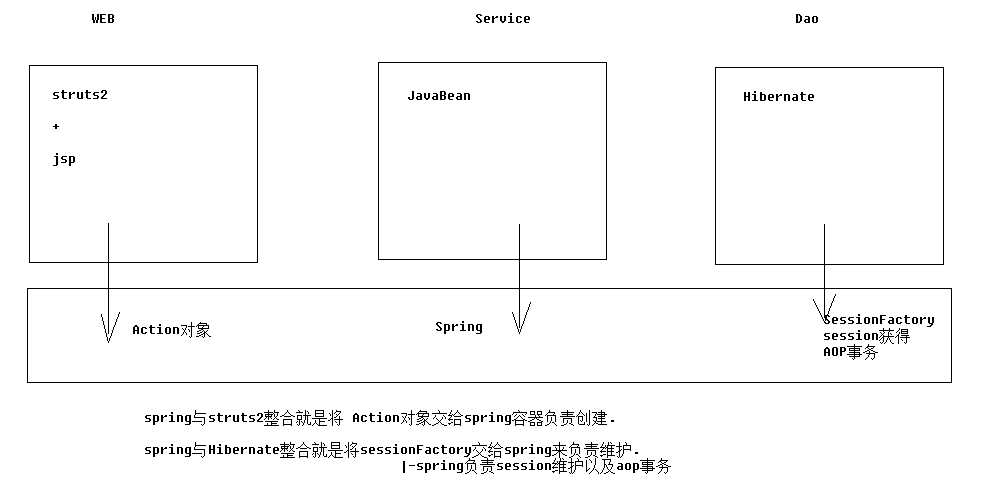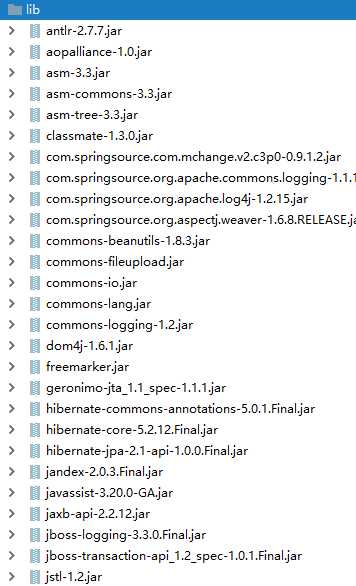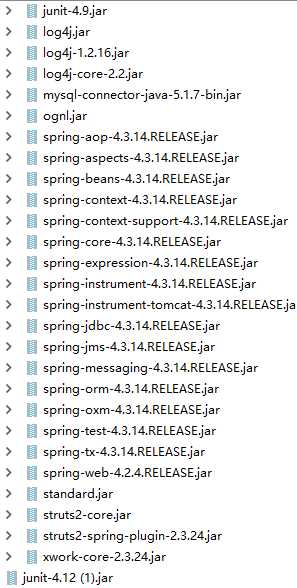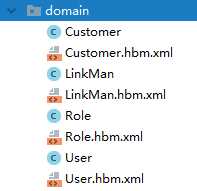整合原理

整合步骤:
1、导包


2、单独配置Spring容器
导入约束(spring-config.xml)
<?xml version="1.0" encoding="UTF-8"?>
<beans xmlns:xsi="http://www.w3.org/2001/XMLSchema-instance"
xmlns="http://www.springframework.org/schema/beans"
xmlns:context="http://www.springframework.org/schema/context"
xmlns:aop="http://www.springframework.org/schema/aop"
xmlns:tx="http://www.springframework.org/schema/tx"
xsi:schemaLocation="http://www.springframework.org/schema/beans http://www.springframework.org/schema/beans/spring-beans-4.2.xsd
http://www.springframework.org/schema/context http://www.springframework.org/schema/context/spring-context-4.2.xsd
http://www.springframework.org/schema/aop http://www.springframework.org/schema/aop/spring-aop-4.2.xsd
http://www.springframework.org/schema/tx http://www.springframework.org/schema/tx/spring-tx-4.2.xsd ">
配置spring随项目启动(web.xml)
<!-- 可以让spring容器随项目的启动而创建,随项目的关闭而销毁 -->
<listener>
<listener-class>org.springframework.web.context.ContextLoaderListener</listener-class>
</listener>
<!-- 指定加载spring配置文件的位置 -->
<context-param>
<param-name>contextConfigLocation</param-name>
<param-value>classpath:spring-config.xml</param-value>
</context-param>
3、单独配置struts2
配置核心过滤器
<!--配置struts2核心过滤器-->
<filter>
<filter-name>struts2</filter-name>
<filter-class>org.apache.struts2.dispatcher.filter.StrutsPrepareAndExecuteFilter</filter-class>
</filter>
<filter-mapping>
<filter-name>struts2</filter-name>
<url-pattern>/*</url-pattern>
</filter-mapping>
4、struts2与spring整合
配置常量(Struts.xml)
<!--将struts对象交给Spring创建--> <constant name="struts.objectFactory" value="spring"></constant>
配置spring负责创建action以及组装
spring-config.xml
<!-- action -->
<!-- 注意:Action对象作用范围一定是多例的.这样才符合struts2架构 -->
<bean name="userAction" class="cn.x5456.web.action.UserAction" scope="prototype">
<property name="userService" ref="userService"></property>
</bean>
Struts.xml
<package name="crm" namespace="/" extends="struts-default">
<!--配置全局异常-->
<global-exception-mappings>
<exception-mapping exception="java.lang.RuntimeException" result="error"></exception-mapping>
</global-exception-mappings>
<action name="UserAction_*" class="userAction" method="{1}"> <!--将class的值改为Spring管理对象的名字-->
<result name="error" type="redirect">/login.jsp</result>
<result name="success" type="redirect">/index.htm</result>
<allowed-methods>login</allowed-methods>
</action>
</package>
5、单独配置hibernate
导入实体类&orm元数据

配置文件
<?xml version="1.0" encoding="UTF-8"?> <!DOCTYPE hibernate-configuration PUBLIC "-//Hibernate/Hibernate Configuration DTD 3.0//EN" "http://www.hibernate.org/dtd/hibernate-configuration-3.0.dtd"> <hibernate-configuration> <session-factory> <property name="hibernate.connection.driver_class">com.mysql.jdbc.Driver</property> <!-- 数据库url --> <property name="hibernate.connection.url">jdbc:mysql://127.0.0.1:3306/xingedb</property> <!-- 数据库连接用户名 --> <property name="hibernate.connection.username">root</property> <!-- 数据库连接密码 --> <property name="hibernate.connection.password">xxx</property> <!-- 数据库方言--> <property name="hibernate.dialect">org.hibernate.dialect.MySQLDialect</property> <!-- 将hibernate生成的sql语句打印到控制台 --> <property name="hibernate.show_sql">true</property> <!-- 将hibernate生成的sql语句格式化(语法缩进) --> <property name="hibernate.format_sql">true</property> <!-- 自动更新表,没有创建 --> <property name="hibernate.hbm2ddl.auto">update</property> <!--Spring会管理事务,session与线程绑定,所以要注释掉************************--> <!--事务隔离级别--> <!--<property name="hibernate.connection.isolation">4</property>--> <!--session与线程绑定--> <!--<property name="hibernate.current_session_context_class">thread</property>--> <!-- 引入orm元数据,路径书写: 填写src下的路径 --> <mapping resource="cn/x5456/domain/Customer.hbm.xml" /> <mapping resource="cn/x5456/domain/LinkMan.hbm.xml" /> <mapping resource="cn/x5456/domain/User.hbm.xml" /> <mapping resource="cn/x5456/domain/Role.hbm.xml" /> </session-factory> </hibernate-configuration>
6、spring整合hibernate
将sessionFactory对象交给spring容器管理(此时可以不要hibernate.xml配置文件)
<!--配置SessionFactory到容器中-->
<bean name="sessionFactory" class="org.springframework.orm.hibernate5.LocalSessionFactoryBean">
<!-- 配置hibernate基本信息 -->
<property name="hibernateProperties">
<props>
<!-- 必选配置 -->
<prop key="hibernate.connection.driver_class" >com.mysql.jdbc.Driver</prop>
<prop key="hibernate.connection.url" >jdbc:mysql:///xingedb</prop>
<prop key="hibernate.connection.username" >root</prop>
<prop key="hibernate.connection.password" >xxx</prop>
<prop key="hibernate.dialect" >org.hibernate.dialect.MySQLDialect</prop>
<!-- 可选配置 -->
<prop key="hibernate.show_sql" >true</prop>
<prop key="hibernate.format_sql" >true</prop>
<prop key="hibernate.hbm2ddl.auto" >update</prop>
</props>
</property>
<!-- 引入orm元数据,指定orm元数据所在的包路径,spring会自动读取包中的所有配置 -->
<property name="mappingDirectoryLocations" value="classpath:cn/x5456/domain" ></property>
</bean>
7、spring整合c3p0连接池
准备db.properties
#加一个(任意)前缀,防止与关键字冲突 jdbc.jdbcUrl=jdbc:mysql:///xingedb jdbc.driverClass=com.mysql.jdbc.Driver jdbc.user=root jdbc.password=xxx
配置文件
<!--1.设置读取db.properties文件-->
<context:property-placeholder location="classpath:db.properties"></context:property-placeholder>
<!--2.设置连接池-->
<bean name="dataSource" class="com.mchange.v2.c3p0.ComboPooledDataSource">
<property name="DriverClass" value="${jdbc.driverClass}"></property>
<property name="JdbcUrl" value="${jdbc.jdbcUrl}"></property>
<property name="User" value="${jdbc.user}"></property>
<property name="Password" value="${jdbc.password}"></property>
</bean>
<!--配置SessionFactory到容器中-->
<bean name="sessionFactory" class="org.springframework.orm.hibernate5.LocalSessionFactoryBean">
<!--3.将连接池注入sessionFactory-->
<property name="dataSource" ref="dataSource"></property>
<!-- 配置hibernate基本信息 -->
<property name="hibernateProperties">
<props>
<!-- 必选配置,由于使用连接池(在连接池中配置),就不用这4项了 -->
<!--<prop key="hibernate.connection.driver_class" >com.mysql.jdbc.Driver</prop>-->
<!--<prop key="hibernate.connection.url" >jdbc:mysql:///xingedb</prop>-->
<!--<prop key="hibernate.connection.username" >root</prop>-->
<!--<prop key="hibernate.connection.password" >710130520a</prop>-->
<prop key="hibernate.dialect" >org.hibernate.dialect.MySQLDialect</prop>
<!-- 可选配置 -->
<prop key="hibernate.show_sql" >true</prop>
<prop key="hibernate.format_sql" >true</prop>
<prop key="hibernate.hbm2ddl.auto" >update</prop>
</props>
</property>
<!-- 引入orm元数据,指定orm元数据所在的包路径,spring会自动读取包中的所有配置 -->
<property name="mappingDirectoryLocations" value="classpath:cn/x5456/domain" ></property>
</bean>
8、spring整合hibernate环境操作数据库
查询方法:
public class UserDaoImpl extends HibernateDaoSupport implements UserDao { // 通过集成HibernateDaoSupport,获取HibernateTemplate
public User getUserByUsercode(String user_code) {
// 方法一:hql查询
User u = super.getHibernateTemplate().execute(new HibernateCallback<User>() {
@Override
public User doInHibernate(Session session) throws HibernateException {
String hql = "from User where user_code=?";
Query query = session.createQuery(hql);
query.setParameter(0, user_code);
User u = (User) query.uniqueResult();
return u;
}
});
return u;
// 方法二:Criteria查询
DetachedCriteria dc = DetachedCriteria.forClass(User.class); // 离线对象
dc.add(Restrictions.eq("user_code",user_code));
List<User> list = (List<User>) super.getHibernateTemplate().findByCriteria(dc); // 只返回list
if (list!=null&&list.size()>0){
return list.get(0);
}else {
return null;
}
}
}
需要提供sessionfactory对象
<bean name="userDao" class="cn.x5456.dao.impl.UserDaoImpl">
<property name="sessionFactory" ref="sessionFactory"></property>
</bean>
9、Hibernate版AOP事务
核心事务管理器(只有这个和JDBC版<注入连接池>不同)
<!-- 核心事务管理器 -->
<bean name="transactionManager" class="org.springframework.orm.hibernate5.HibernateTransactionManager" >
<property name="sessionFactory" ref="sessionFactory" ></property>
</bean>
方法一:配置通知 并 织入
<!-- 配置通知 -->
<tx:advice id="txAdvice" transaction-manager="transactionManager" >
<tx:attributes>
<tx:method name="save*" isolation="REPEATABLE_READ" propagation="REQUIRED" read-only="false"/>
<tx:method name="persist*" isolation="REPEATABLE_READ" propagation="REQUIRED" read-only="false" />
<tx:method name="update*" isolation="REPEATABLE_READ" propagation="REQUIRED" read-only="false" />
<tx:method name="modify*" isolation="REPEATABLE_READ" propagation="REQUIRED" read-only="false" />
<tx:method name="delete*" isolation="REPEATABLE_READ" propagation="REQUIRED" read-only="false" />
<tx:method name="remove*" isolation="REPEATABLE_READ" propagation="REQUIRED" read-only="false" />
<tx:method name="get*" isolation="REPEATABLE_READ" propagation="REQUIRED" read-only="true" />
<tx:method name="find*" isolation="REPEATABLE_READ" propagation="REQUIRED" read-only="true" />
</tx:attributes>
</tx:advice>
<!-- 配置将通知织入目标对象,配置切点,配置切面 -->
<aop:config>
<aop:pointcut expression="execution(* cn.x5456.service.impl.*ServiceImpl.*(..))" id="txPc"/>
<aop:advisor advice-ref="txAdvice" pointcut-ref="txPc" />
</aop:config>
方法二:配置注解事务
<!-- 开启注解事务 --> <tx:annotation-driven transaction-manager="transactionManager" />
10、扩大session作用范围
为了避免使用懒加载时出现no-session问题.需要扩大session的作用范围
配置filter
<!-- 扩大session作用范围
注意: 任何filter一定要在struts的filter之前调用(因为如果Struts的拦截器没有放行,就根本走不了我们的filter)
-->
<filter>
<filter-name>openSessionInView</filter-name>
<filter-class>org.springframework.orm.hibernate5.support.OpenSessionInViewFilter</filter-class>
</filter>
<!--配置struts2核心过滤器-->
<filter>
<filter-name>struts2</filter-name>
<filter-class>org.apache.struts2.dispatcher.filter.StrutsPrepareAndExecuteFilter</filter-class>
</filter>
<filter-mapping>
<filter-name>openSessionInView</filter-name>
<url-pattern>/*</url-pattern>
</filter-mapping>
<filter-mapping>
<filter-name>struts2</filter-name>
<url-pattern>/*</url-pattern>
</filter-mapping>
